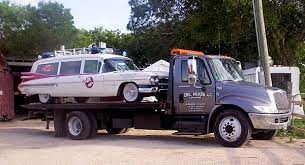When it comes to finding the most efficient and safe towing method, it's essential to weigh the pros and cons of different approaches. As a car owner or a business requiring city wide towing services, you want to ensure that your vehicle or equipment is transported securely and without any damage.
Towing companies understand the importance of offering reliable and effective towing solutions, and two popular methods often utilized are Tilt Deck and Traditional Towing.
In this article, we'll delve into the details of both methods, highlighting their distinct features and advantages to help you make an informed decision when the need for towing arises.
Tilt Deck Towing Explained
Tilt Deck towing, also known as flatbed towing, is a method that involves a specially designed truck with a flatbed deck that tilts. The truck backs up to the disabled vehicle or equipment, and the deck tilts, forming a ramp. The disabled vehicle is then carefully driven or pulled onto the flatbed, securing it in place for transportation. This method is commonly used for transporting cars, motorcycles, and smaller equipment.
Advantages Of Tilt Deck Towing
Enhanced Safety: Tilt Deck towing ensures that the disabled vehicle or equipment is entirely off the road and securely fastened onto the flatbed. This reduces the risk of accidents and damage during transportation.
Versatility: Tilt Deck tow trucks can accommodate a wide range of vehicles, including low-clearance cars, sports cars, and motorcycles, making it a versatile option for various towing needs.
Reduced Wear and Tear: Since the disabled vehicle doesn't need to be towed with its wheels on the ground, there is less wear and tear on the tires and suspension components during transportation.
The Ins And Outs Of Traditional Towing
Traditional towing, also known as hook-and-chain towing, is one of the oldest methods in the towing industry. It involves using a tow truck equipped with chains or straps to lift the front or rear of the disabled vehicle off the ground and tow it behind the truck. While this method is still used today, it has some drawbacks that have led to the popularity of alternative methods like Tilt Deck towing.
Advantages Of Traditional Towing
Affordability: Traditional towing tends to be more budget-friendly, requiring less specialized equipment than Tilt Deck towing.
Suitable for Short Distances: Traditional towing can be effective for short-distance tows, such as moving a broken-down car to a nearby repair shop.
Comparing The Advantages: Which Method Reigns Supreme?
a. Safety: Tilt Deck towing takes the lead in terms of safety, as it eliminates the risk of the disabled vehicle dragging on the road surface or losing control during transit. This can prevent further damage to the vehicle and ensure the safety of other road users.
b. Versatility: Tilt Deck towing again gains an edge in versatility, as it can accommodate a broader range of vehicles and equipment. Traditional towing is limited to certain vehicle types and may not be suitable for low-clearance or specialty vehicles.
c. Equipment Protection: Tilt Deck towing's flatbed design ensures that the vehicle's wheels are securely placed on the deck, reducing the risk of damage to the undercarriage, tires, and suspension components. On the other hand, Traditional towing's hook-and-chain method may cause scratches or dents to the vehicle's body.
d. Convenience: Tilt Deck towing offers more convenience, as it requires less time to load and unload the disabled vehicle. Traditional towing may take longer, especially if the vehicle needs to be positioned carefully to avoid damage during towing.
Also Read: Choosing A Reliable Emergency Towing Service: Factors To Consider
Which Towing Method Is Right For You?
The choice between Tilt Deck and Traditional towing depends on various factors, including the type of vehicle or equipment being towed, the distance of transportation, and your specific towing requirements. Here are some guidelines to help you make the right decision:
a. Choose Tilt Deck Towing if:
-
You need to transport low-clearance vehicles or specialty vehicles.
-
Safety is a top priority, and you want to minimize the risk of damage during transportation.
-
Versatility is crucial, and you may need towing services for different types of vehicles and equipment.
b. Choose Traditional Towing if:
-
You are on a budget and need a cost-effective towing solution for short-distance tows.
-
The vehicle being towed is not at risk of damage through the hook-and-chain method.
-
You require a towing service for a simple, routine tow over a short distance.
Conclusion
In conclusion, both Tilt Deck and Traditional towing have their merits, but Tilt Deck towing appears to reign supreme in terms of safety, versatility, and equipment protection. As a reputable towing company, it's essential to offer diverse towing services that cater to various customer needs.
By understanding the strengths of each method, towing companies can better serve their clients and ensure a smooth, secure, and reliable towing experience for all types of vehicles and equipment. Whether it's a Tilt Deck or a Traditional tow, the ultimate goal remains the same: to provide excellent service and keep our roads safe for everyone.


